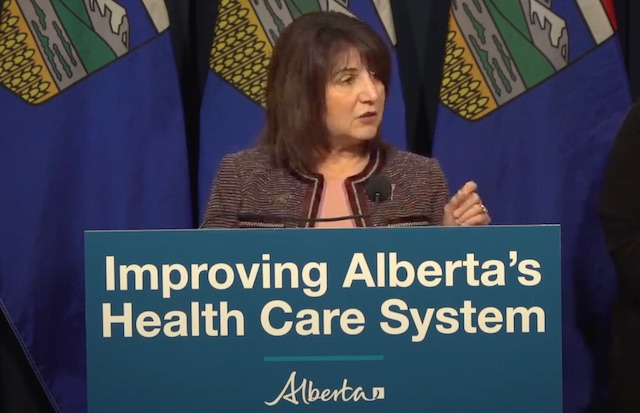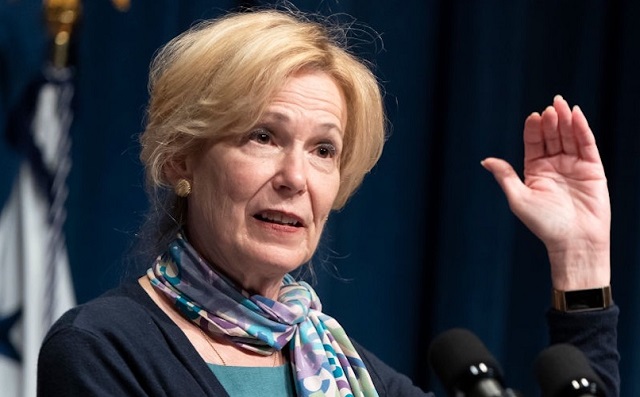Alberta
Province says improving primary health care system will take pressure off emergency care

Strengthening health care: Improving access for all
Alberta’s government is stabilizing and strengthening primary health care across the province so that everyone can access care when and where they need it.
Primary health care is the first point of contact Albertans have with the health care system, and includes health professionals such as family doctors, nurse practitioners and pharmacists.
Last fall, health care leaders, Indigenous partners and experts from across Canada and around the world came together to form advisory panels as part of the Modernizing Alberta’s Primary Health Care System (MAPS) initiative. The panels identified immediate, medium- and long-term improvements to strengthen Alberta’s primary health care system.
Alberta’s government will begin moving forward on the recommendations in the final report to improve access to primary health care for all Albertans. The recommendations will be implemented through a phased approach, with several moving forward immediately, followed by medium- and longer-term improvements that will enhance community-based primary health care across Alberta.
“Today marks an important step in the work I am undertaking to enhance primary care as the foundation of our health care system. The Modernizing Alberta’s Primary Health Care System (MAPS) reports clearly identify the challenges our system is facing, and their release signals this government’s commitment to take immediate and ongoing action to support and stabilize primary health care in our province. I look forward to the ongoing work of implementing needed changes with our health care partners and providers.”
Several immediate actions are being taken, all of which are consistent with recommendations from the panels. These actions are critical to ensuring Albertans have better access to health care when and where they need it. Alberta Health continues to work toward implementing recommendations over the medium and long term.
“The MAPS recommendations represent a huge leap forward for our primary health system – strengthening and clarifying governance, community involvement, and recognizing the importance of integrated team-based care that allows Albertans to access primary care from the most appropriate team member at the right time, in the right place. This is how we can ensure equitable access to care across our province.”
Strengthening primary health care
Alberta’s government is acting immediately on recommendations to improve primary health care and increase Albertans’ access to the medical care they need, including:
- Creating a primary health care division within Alberta Health.
- Allocating $57 million over three years to provide family doctors and nurse practitioners with support to help manage their increasing number of patients. Each provider has the potential to receive up to $10,000 annually.
- Working with the Alberta Medical Association to create a task force to recommend a new payment model for family physicians that encourages comprehensive primary care – where a patient has a regular family doctor who they develop a long-term relationship with and who works with them to ensure all their health care needs are met.
- Developing a memorandum of understanding with the Alberta Medical Association to collaborate on a transition to a new physician compensation model, modernize primary care governance and enable family doctors to spend more time with patients and less time on paperwork and immediately stabilize primary care.
- Expanding online mental health services, allowing doctors to bill for virtual mental health checks and therapy, and compensating them for extra time spent with patients virtually.
- Ensuring doctors get paid if patients can’t prove insurance coverage, reducing administrative burden. This is known as “good faith” claims.
- Introducing a payment system that will support nurse practitioners to open their own clinics, take on patients and offer services based on their scope of practice, training and expertise. Nurse practitioners have completed graduate studies ensuring that they are properly trained to examine patients, provide diagnoses and prescribe medication.
“We know that a strong primary health care system is foundational for better health care for Albertans, and that starts with access to a family physician and a team of dedicated providers. Primary care requires dedicated planning, resourcing and coordination. We are pleased to join the task force and believe continued collaboration and immediate action will bring us closer to our collective vision.”
“The Nurse Practitioner Association of Alberta is elated to see the newly released MAPs report, which provides direction for primary care reform and includes the full integration of nurse practitioners. The Government of Alberta is taking a significant and essential step in improving access to primary care for Albertans. This announcement is a win-win for Albertans and nurse practitioners, as it recognizes the valuable contributions of NPs delivering high-quality care for Albertans and their ability to decrease the stress on the health care system. We are excited about the future of primary care in Alberta.”
“These actions are welcome news for rural Alberta. Ensuring Albertans have access to health care professionals when and where they need it is essential. This work will help to solve some of the unique challenges for rural Albertans by encouraging health professions to practise in rural parts of the province.”
Strengthening Indigenous health care
Indigenous Peoples face many barriers to access appropriate health care. To support better health outcomes, the government will build more meaningful connections with Indigenous leaders and communities to identify improvements that reflect the unique nature of their communities. Immediate actions include:
- Creating an Indigenous health division within Alberta Health.
- Creating a $20-million fund for Indigenous communities to design and deliver innovative primary health care services and projects.
- Creating an Indigenous patient complaints investigator and Elders roster to investigate incidences of racism during the delivery of health care and provide culturally safe support to Indigenous patients throughout the patient complaint process.
- Investing in a community-based Indigenous patient navigator program to support Indigenous peoples throughout their health care journey.
“It is unacceptable that Indigenous Peoples continue to face so many barriers when accessing primary health care. It is crucial that all First Nations, Métis and Inuit peoples have equitable access to community-based primary health care that is culturally safe, respects their unique needs and is free of racism. These immediate actions will help us achieve that goal.”
“The panel’s recommendations provide a clear and stable pathway to create a safe, culturally appropriate primary health care system that includes Indigenous people as partners and leaders at every stage of the development, governance and delivery of health care services. The best solutions exist within our respective communities, tailored for our unique needs and priorities. The commitments made today are an important first step toward improving health equity for Indigenous Peoples, regardless of where they live in Alberta.”
Quick facts
- Advisory panels were established through MAPS in fall 2022 to identify primary health care improvements in the short term and over the next 10 years.
- Final reports from the panels were submitted in spring 2023.
- The strategic advisory panel final report contains 11 recommendations to refocus the system around primary health care with an emphasis on:
- access to team-based care
- integration between primary health care and community care
- a foundation of a coordinated and accountable primary health care system
- The Indigenous advisory panel final report contains 22 recommendations under five themes:
- improve health equity for Indigenous Peoples
- address Indigenous racism in health care
- build culturally safer primary health care and an Indigenous workforce
- create system innovation and support community capacity
- Indigenous ownership, stewardship, design and delivery of health care services
- Budget 2023 allocated $125 million over three years to implement recommendations from MAPS.
- The next step will be to further engage with health care partners, including Indigenous communities, to implement these immediate priorities and the broader MAPS recommendations.
Related information
Alberta
Province announces next step to revamped health care system

Setting the foundation for a refocused health system
Proposed legislation would support the refocusing of Alberta’s health care system to ensure Albertans get the care they need when and where they need it.
On Nov. 8, 2023, Alberta’s government announced plans for a refocused health care system to ensure patients are receiving the care they need, when and where they need it. To achieve this, Alberta’s government will be creating four new organizations, one for each priority health services sector: acute care, primary care, continuing care and mental health and addiction.
If passed, the Health Statutes Amendment Act would enable the government to take the necessary next steps to refocus the province’s health care system. The legislation would ensure Albertans have a system that works for them by prioritizing their need to find a primary care provider, receive urgent care without long waits, have access to the best continuing care options and obtain excellent mental health and addiction treatment.
“We are taking another step toward improving health care by updating legislation and enabling the governance and oversight required to refocus the health system. The critical improvements to transparency and accountability will help support the successful refocusing of the health care system to one that is responsive, effective and reflects the needs and priorities of Albertans today and for future generations.”
The Health Statutes Amendment Act will enable the transition from one regional health authority, Alberta Health Services, to an integrated system of four sector-based provincial health agencies including primary care, acute care, continuing care and mental health and addiction. The agencies will be responsible for delivering integrated health services, ensuring Albertans receive timely access to care, regardless of where they live.
The Health Statutes Amendment Act establishes roles for an oversight minister and sector minister. The Minister of Health will take on the role of oversight minister, responsible for setting the strategic direction of the overall health system. A sector minister will be responsible for a specific health services sector. For example, the sector minister for Recovery Alberta is the Minister of Mental Health and Addiction. On the recommendation of the oversight minister, additional health service sectors may be established and designate a minister responsible for that newly created sector.
Enhanced government oversight will help Alberta’s government to better direct resources to the front lines where they are needed the most, improve patient care overall and support health care professionals.
“Mental health and addiction have been growing issues within our society and need to be prioritized within our health care system. Amid an addiction crisis, a refocused health system will allow for mental health and addiction services to get the attention, oversight and focus they need. Recovery Alberta would allow for improved mental health and addiction care across the province as an important part of an integrated health system.”
“Refocusing Alberta’s healthcare system is a crucial step towards ensuring that we can deliver a framework that prioritizes accessibility, accountability, and patient-centered care. By streamlining operations, improving oversight and fostering collaboration, we are setting a strong foundation for a healthcare system that is better equipped to address the diverse needs of each of our communities.”
The legislation will enable the minister of health to transfer employees or classes of employees from AHS to the new sector-based organizations, once established. During the transition period, AHS will be enabled to continue operating as a regional health authority. Employee transfers will be seamless, maintaining existing bargaining relationships and collective agreements. This will ensure stability for the workforce, unions and government as the health system refocus is implemented. There will be no job losses for staff who transition into the new organizations.
Amendments to be made to existing legislation
The Health Statutes Amendment Act includes amendments to the Regional Health Authorities Act and the Health Information Act, which have not been updated since the 1990s.
As part of these amendments, the name of the Regional Health Authorities Act will change to the Provincial Health Agencies Act. The amended Provincial Health Agencies Act will remove outdated references to allow the transition from a single regional health authority to a unified, sector-specific provincial health system. This will clarify the scope and accountabilities of provincial health agencies and health service providers going forward.
The amendments will also place responsibility on the provincial health agencies for operational planning and oversight of clinical service delivery across the province. This will enable provincial health agencies to set priorities in the provision of health service delivery. The agencies will also be tasked with sharing information and collaborating closely to support seamless patient care as the transition to the refocused health care system takes place.
Alberta’s government is committed to ensuring that patient information continues to remain safe and secure through this transition. Amendments to the Health Information Act will be introduced to support the new health system refocus and to support the establishment of the Canadian Centre of Recovery Excellence. These amendments will allow the Ministry of Health, the Ministry of Mental Health and Addiction, the four new provincial health agencies, the Health Quality Council of Alberta and Canadian Centre of Recovery Excellence to have the authority to use health information for health system purposes.
If passed, the Health Statutes Amendment Act will enable Recovery Alberta, the mental health and addiction provincial health agency, to begin operating in the summer of 2024. The primary care, acute care and continuing care provincial health agencies are expected to be established in the fall.
Quick facts
- Consequential amendments are changes made to existing legislation due to new legislation being passed. These amendments are necessary to ensure legislative alignment with the proposed amendments to the Regional Health Authorities Act.
- To support the Regional Health Authorities Act amendments and ensure alignment, 43 other acts are being consequentially amended – for example, to replace references to “regional health authority” with “provincial health agency” where necessary.
- AHS will remain a key provider of health services, and in fall 2024 will transition to focusing on the provision of acute care services.
- Alberta’s government introduced the Canadian Centre of Recovery Excellence Act which, if passed, will establish the Canadian Centre of Recovery Excellence (CoRE) as a public agency that would support the Government of Alberta, including Mental Health and Addiction, and Recovery Alberta in advancing the Alberta Recovery Model.
Related information
- Establishing the future of Alberta health care
- Refocusing health care in Alberta
- Recovery Alberta
- Canadian Centre of Recovery Excellence
- Bill 22: Health Statutes Amendment Act, 2024
Related news
- Refocusing on patient-centred care (Nov. 8, 2023)
Alberta
Red Deer Hospital Lottery – Second Chance Early Bird Prize!!!

|
|
|
|
|
-

 City of Red Deer1 day ago
City of Red Deer1 day agoCity Council paving the way for more house suites, backyard suites, tiny homes, and duplexes
-

 Opinion2 days ago
Opinion2 days agoCanada’s fertility, marriage rates plummet to record lows: report
-

 Uncategorized22 hours ago
Uncategorized22 hours agoRCMP recruitment failure has Alberta advocacy group calling for Provincial Police Service
-

 Health21 hours ago
Health21 hours agoPrivate Footage Reveals Leading Medical Org’s Efforts To ‘Normalize’ Gender Ideology
-

 COVID-1910 hours ago
COVID-1910 hours agoJapan’s most senior cancer doctor: COVID shots are ‘essentially murder’
-

 COVID-192 days ago
COVID-192 days agoFormer COVID coordinator Deborah Birx now admits jabs could have injured ‘thousands’
-

 Bruce Dowbiggin2 days ago
Bruce Dowbiggin2 days agoWhy Do The Same Few Always Get The Best Sports Scoops?
-

 Health1 day ago
Health1 day agoTHE WPATH TAPES: Behind-The-Scenes Recordings Reveal What Top Gender Doctors Really Think About Sex Change Procedures









